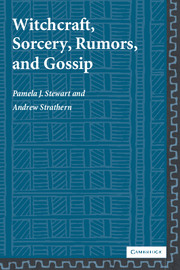5 - New Guinea
Published online by Cambridge University Press: 20 November 2009
Summary
The materials from Africa and India fit well, in somewhat different ways, into the historical contexts found in Papua New Guinea. One common feature, of course, is the encompassing influence of colonial powers, although the trajectories of colonialism differ considerably in different places, as many authors have shown (e.g., Thomas 1994). The imposition of new forms of hierarchy, the exploitative use of labor, the extraction of resources, and the creation of wide ranges of new desires without the capacity to realize them are all elements widely shared between colonial contexts, and these have fed into both the earlier patterns of insurgency dealt with by Guha and the latter-day forms of apocalypticism and witch-finding discussed by the Comaroffs. In all of these contexts the general conditions set out by Guha (1994 [1983]: 256–73; see Chapter 4) for the influence of rumor in social processes apply well: low levels of literacy and a dependence on oral transmission, the creation of solidarity through the motivated passing of information, the anonymous character of information passed by word of mouth, and the quality of ambiguity, uncertainty, and portentousness that emerges from these circumstances of its production.
The colonial contexts with which we are familiar from our Papua New Guinea fieldwork and which are replicated widely elsewhere include a number of characteristic event sequences in which rumors played a major role. These include, for instance, epidemics and rumors of epidemics, cargo cults and millennial rumors, and witchcraft suspicions and accusations.
- Type
- Chapter
- Information
- Witchcraft, Sorcery, Rumors and Gossip , pp. 113 - 139Publisher: Cambridge University PressPrint publication year: 2003

